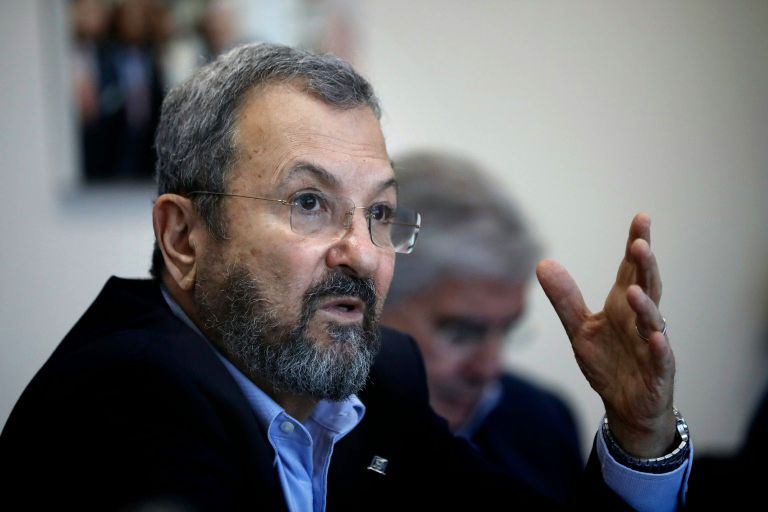Australia/Israel Review
Barak: Coping with Palestinians’ unreadiness for peace
Sep 21, 2018 | Ahron Shapiro

The Palestinians aren’t ready to make peace and Israel can’t force them to, former Israeli Prime Minister Ehud Barak told an AIJAC media luncheon on Aug. 28. In the meantime, he said, Israel should develop a sensible settlement policy aimed at protecting the two-state option and retaining settlement blocs, while maintaining the security status quo in the West Bank.
Barak, who served as prime minister from 1999-2001 and more recently as defence minister under Prime Minister Binyamin Netanyahu, was visiting Australia as a guest of the Jewish National Fund. He also focused on the Iranian nuclear threat and Israel’s national success story at the meeting.
Barak remains politically engaged, having been recently touted in the Israeli media as a potential internal challenger to current Labor party leader Avi Gabbai. He also was given top billing at a left-wing rally in Israel days before he arrived in Australia.
As he told the journalists in Melbourne, he is a committed member of the opposition, “on the other side of the barricade almost automatically with most… things [regarding the Netanyahu] government.”
In spite of this, at the briefing, Barak expressed many positions vis-à-vis the Palestinians shared by the current government, including the conviction that Israel likely lacks a partner on the Palestinian side willing or able to deliver peace in the short term.
“To tell you the truth, I’m not sure whether [a peace deal] is achievable now – that if just Netanyahu and [current Defence Minister Avigdor] Lieberman would enter a room, close the door behind them and… discuss seriously the Palestinian issue, it’s promised that they can end up with a breakthrough,” Barak said. “I cannot say for sure what can be achieved with the Palestinians…”
“To make peace, it takes two to tango. And you cannot impose your will or even your sincerity on the other side,” he added.
Like the current Israeli government, Barak takes a very cautious approach to relinquishing control of security in the West Bank to Palestinian forces.
The IDF must “keep security control over the whole area for whatever time frame that might be needed. Five, 15, 50 years. Whatever it takes,” Barak said, “and leave on the other side the opportunity for the Palestinians when the time comes their right to establish their own demilitarised state. And only when we are fully satisfied with the practical aspects of security – not with the idea, [but] with the practical institution of providing security, we might consider gradually loosening our security hold.”
In response to a question, Barak said that by maintaining overriding security control in the West Bank, Israel could avoid repeating mistakes made during the 2005 Gaza disengagement, which created a power vacuum allowing rapid militarisation and an eventual takeover by Hamas.
Barak, however, parted ways sharply with the Netanyahu Government’s reluctance to be drawn into open discussions on the future of isolated settlements in the West Bank in future peace scenarios.
Barak pressed for the Israeli Government to publicly renounce any political claims to areas in the West Bank outside of the settlement blocs. While Israelis may well have a right to settle in these areas, he said it is a matter of “crucial” national interest that it openly distances itself from these areas and preserves Israel’s demographic balance by separating politically from them and protecting the two-state option.
Israel, Barak said, needs “in political terms, practically, to delineate a line within which we will have all our security needs, 80% of the settlers and a solid Jewish majority for generations to come”.
A failure to make such a “delineation” of borders with the Palestinians, Barak said, would see Israel risk falling into a one-state trap which would be a “disaster” for all concerned.
Barak did not specify whether his plan would require the immediate evacuation of any isolated settlements, even in the absence of substantive negotiations or a peace agreement, or if a declaration, freeze or combination of the two would suffice.
On the issue of Iran, Barak warned of the severe threat to Israel posed by continued Iranian encroachment in Syria, including through the transfer of highly accurate rocket systems to Hezbollah.
Iran’s nuclear program, he added, remains a longer-term threat, albeit “delayed” by the Iranian nuclear deal.
“[Israel must] be ready to do whatever it takes to stop them from turning into a nuclear military power, hopefully in coordination with the United States,” Barak said, “but we should always keep all the options on the table, including Israeli independent action.”
Yet none of the threats that Israel faces should take away from Israel’s remarkable achievements, or suggest that Israel is in a precarious position, Barak emphasised.
“At 70, Israel and the Zionist project is probably the most successful national project of the 20th century,” Barak marvelled.
“The good news is that, as a result of our achievements… Israel can shape its own future according to our interests, and in the Zionist tradition, take our destiny in our hands.”
Tags: Iran, Israel, Palestinians






